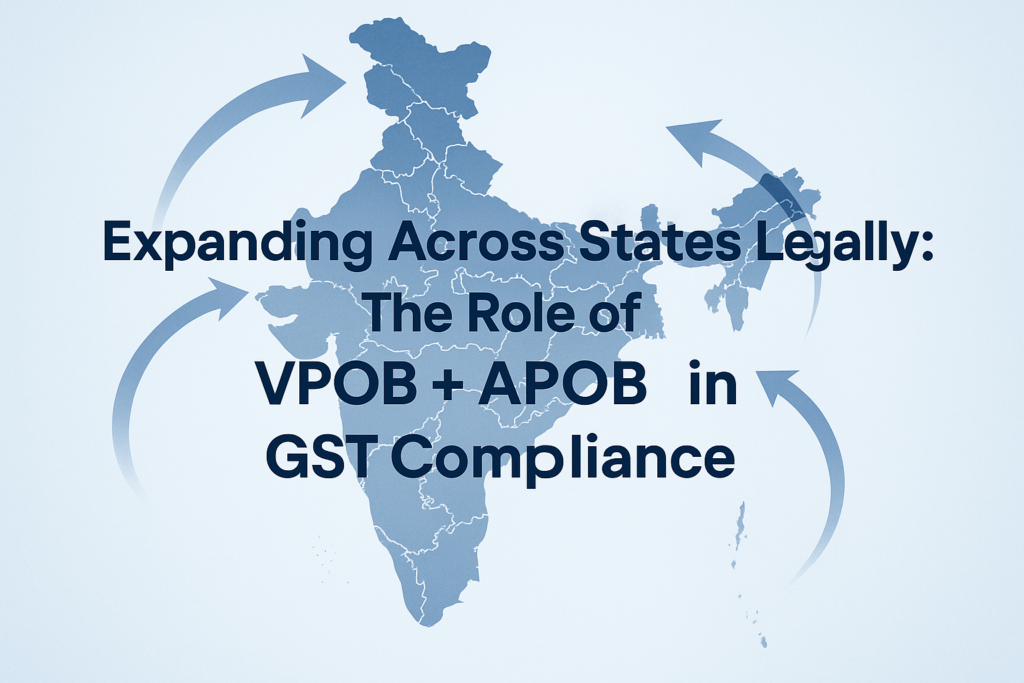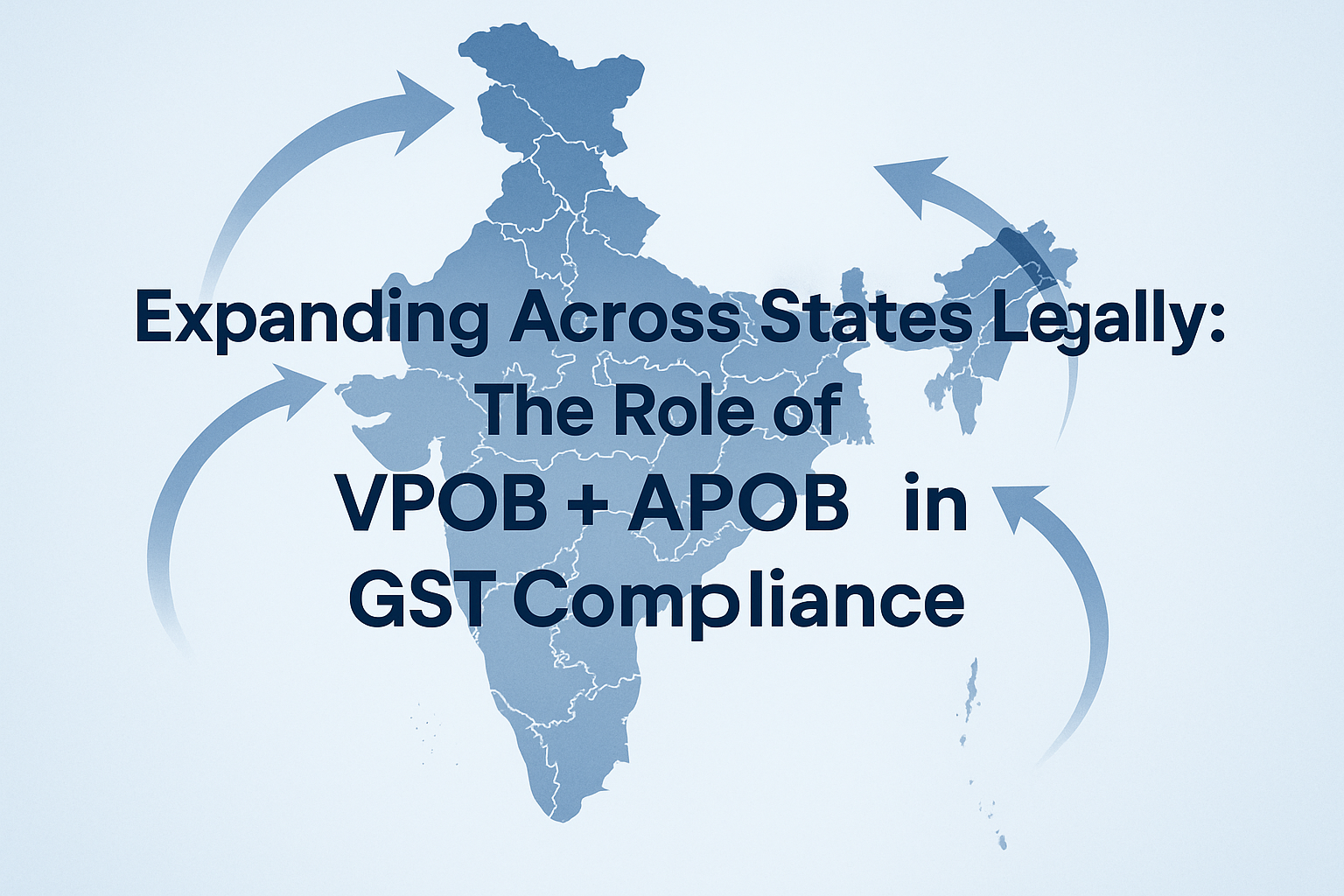Vendors are searching for methods to expand their customer base by selling across state lines in India’s rapidly evolving Vpob for eCommerce sellers. However, as the company expands, it is crucial that it abides by all state GST regulations. Without a physical office, adhering to these legal requirements can be challenging.
Recognizing the Legislation Needing Multi-State GS
company that sells goods or services in more than one state is required by the GST Act to register for GST in each state in which it conducts business. Thus, a Maharashtra-based internet vendor wishing to ship goods to Tamil Nadu or Karnataka must obtain a separate GSTIN for each state.
In order to register for GST in a new state, a company must declare a Principal Place of Business (PPOB). This is a business address that is verifiable. In legal terms, this is where the VPOB becomes significant.
How is a VPOB legal, and what is it?The legal business address that a service provider provides you, typically in a shared workspace or virtual office, is known as a Virtual Place of Business (VPOB). The GST department is aware of it, and you can use it to:
register for GST in your state;
receive official notifications and letters
fulfilling documentation requirements, such as a property tax receipt, NOC, electricity bill, and rental agreement
For eCommerce vendors, a virtual address is a legal lifeline. It enables them to grow without having to construct pricey offices or warehouses in every state.
Legal support for VPOB’s GST registration
Many online sellers are curious about the legality of virtual offices, or VPOBs. Yes, as long as the service provider provides you with the necessary paperwork, such as a registered rent agreement (notarized or e-stamped), an owner’s No Objection Certificate (NOC), a utility bill or property tax receipt, or a layout plan or photo (if required).
all of the documentation is authentic, matches the application, and the property isn’t on a blacklist or hasn’t been used excessively by shell companies, the GST authorities will accept VPOB addresses. This indicates that for eCommerce retailers, the VPOB is a totally safe and legal option.
How VPOB and APOB Collaborate
place of business is the VPOB, but many sellers must include the addresses of their logistics partners or warehouses, where the goods are actually stored or shipped. These locations may be declared under APOB.
If you have a Flipkart warehouse in the same state as your VPOB in Bengaluru, Karnataka, you can add the warehouse address to your Additional Place of Business once you’ve registered with the VPOB.
VPOB is able to send official and compliance messages thanks to this structure.
• APOB for inventory storage, logistics, and shipping
GST regulations, both must be appropriately disclosed and have the appropriate supporting documentation in the GST REG-01 application.
The Significance of VPOB and APOB for Internet Sellers
1. Cost-effectiveness
The annual cost of renting an entire office in every state can reach hundreds of thousands of dollars. Online businesses can meet all legal requirements while saving a significant amount of money by using a virtual address.
2. Growth in India without relocation
Without relocating, sellers in Delhi or Mumbai can increase their GST footprint to over ten states by combining VPOB and APOB.
3. Quickly entering the market
Once sellers have their GSTIN and APOB, they can list on Amazon, Flipkart, Meesho, Jiomart, and other websites right away. They can begin shipping from nearby warehouses as well.
4. Enhanced logistics
In addition to reducing shipping time and expenses, declaring APOBs closer to customers improves platform ratings.
5. Calm During GST Audits
Checklist for Adherence: Choosing the Best VPOB Service Provider
Every service provider is different. eCommerce sellers should make sure the address is in a busy, commercial area.
A current property tax receipt or utility bill that corresponds to the address
The service provider has received positive reviews and has previously received approval.
They assist you at each stage of the GST registration procedure.
From paperwork completion to registration follow-up and question answering, a trustworthy provider can assist you with everything.
Misconceptions Regarding VPOB
Myth: There is a gray area or a loophole in VPOB.
As long as you have the proper paperwork, it is completely legal.
Rejections typically occur not because the address is virtual but rather because the submission is incomplete or contains errors in the documentation.
Declaring stock under APOB is acceptable and legal.
Using Virtual Infrastructure to Future-Proof eCommerce Businesses
Due to increased scrutiny by GST authorities, sellers should avoid using fictitious addresses, unconfirmed rental agreements, and setups that are impossible to track down. eCommerce vendors can expand their businesses in practical ways and enjoy long-term peace of mind with a verified virtual address.
In an effort to expedite deliveries and reduce returns, online retailers such as Amazon, Flipkart, and Jiomart have also begun requesting GSTINs for each state.
The Termination
Adhering to the ever-changing regulations for Indian eCommerce is mandatory; it is not an option. A scalable, legal, and sensible way to expand your business throughout India without having to deal with the typical issues of office rental or physical presence in every state is to use a VPOB for eCommerce sellers in conjunction with the appropriate APOBs.
If you’re a new online business owner or a developing direct-to-consumer brand, the secret to legal and effective growth throughout India is setting up a virtual address for eCommerce sellers with reliable VPOB and APOB solutions.











Leave a Reply